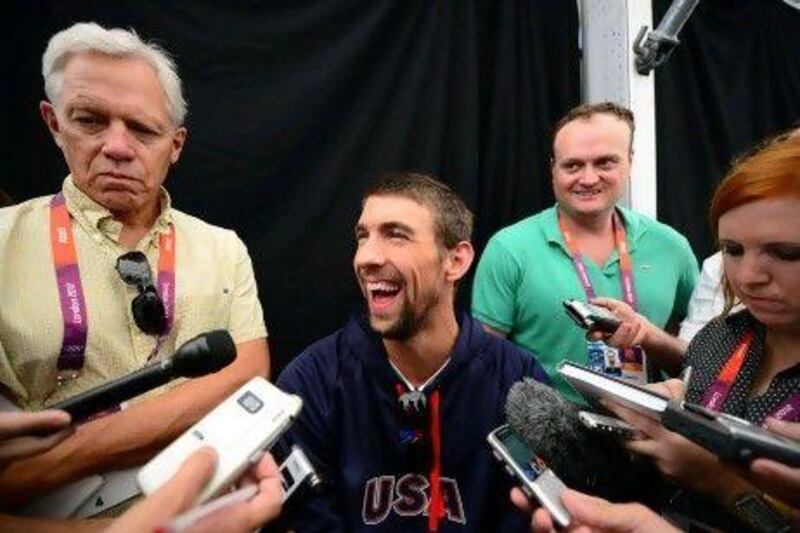For many Americans, the Olympics could not have arrived at a more propitious time.
The feel-good sports carnival interrupts a midsummer malaise, owing to a steady sludge of developments terrible and tragic.
Take the NFL off-season. Please. Amid the drip-drip water torture of continuous news about the New Orleans Saints' pay-to-injure scheme and the latent impact of concussions, there have been reports that add up to a veritable crime wave.
When the Detroit Lions cornerback Aaron Berry was arrested on firearms-related assault charges last weekend, he became the 29th player since the Super Bowl whose misbehaviour brought out the long arm of the law. It was Berry's second shackling in handcuffs, and Detroit, with seven of their players arrested this off-season, had the good sense to cut him.
The dark cloud lingering over college football comes courtesy of Penn State. Its chest-thumping programme was ravaged this week by penalties and fines imposed over a long-term failure to properly deal with a child-abusing assistant coach.
It might take a decade, maybe longer, for the team to regain its footing, not to mention its dignity. As for the supposedly ultimate do-no-wrong coach with the most wins - until he was posthumously docked 111 victories for having hidden his eyes to an aide's sins - Joe Paterno's legacy has been broken to smithereens. (One lesson from this nightmare: do not erect statues of the living, or at least construct them for easy removal. His was hauled away from campus this week.)
Dwarfing those stories was the unthinkable mass shooting in the Colorado movie theatre that sucker-punched a whole nation. With so many victims, a sports tie-in was inevitable. One of the 12 fatalities was an aspiring sportswriter full of life and promise.
Our immersion into the Summer Games, no matter how deep, will not make the disgust and shock disappear altogether. What they will achieve is spreading some balm and generating some smiles, as the Olympics always do.
Most of us welcome these Games, as a brief break from the usual games (football, basketball, baseball), and here is why: aside from the NBA and tennis professionals, plus a few others, US Olympians mirror their fellow Americans. They hold down "day" jobs, worry about paying credit card debt and juggle hectic schedules, all of which tends to invite our support.
That they wear U-S-A on their uniforms entices more cheers, the same as other athletes do from their home nations, while fostering a sense of community unseen nowadays.
In American sports, it is usually city versus city, state versus state. In politics, it is Republicans versus Democrats. In society, urban versus rural, rich versus poor.
For two-and-a-half weeks each quadrennium, almost every American is on the same side. Refreshingly, there is little rooting against an opponent, nor has there been since the fall of the Berlin Wall and the break-up of the Soviet Union circa 1990. Of course, were US Olympians less accomplished, Americans' sports focus might stay on NFL training camps, baseball pennant races and which basketball team Dwight Howard will wind up with. Make no mistake, they embrace winning, and interest are stoked by their team usually topping the medals tables, now at four consecutive Games and running.
Yet, it is the individual success stories, not so much the sum total, that engages the US audience.
They will pant breathlessly along with the swimmers, from the Neptunian human Michael Phelps to the supergirl next door Missy Franklin.
They will gasp in awe at the mighty-mite gymnasts Gabby Douglas and Jordyn Wieber.
They will watch the decathlon contenders Ashton Eaton and Trey Hardee run and jump and throw for recognition as the world's greatest athlete.
They will go every step of the way with the distance runner Bernard Lagat, a native of Kenya who represents the positive side of immigration.
They will pull extra hard for those who have overcome hardships: the swimmer Eric Shanteau (testicular cancer), the boxer Quanitta Underwood (parental abuse), the sprinters Lolo Jones (homelessness), and Jeneba Tarmoh (harsh ruling at the qualifying trials) and the women's volleyball coach Hugh McCutcheon (his father-in-law was stabbed to death at Beijing Games).
They might even set aside their differences of opinion over the polarising pair, LeBron James and Serena Williams, and root for the ball-bouncing home boys and girls of basketball and tennis, despite a sentiment in some circles to exclude multimillionaires from participating.
The lighting of the Olympic cauldron, an exhilarating sports tradition, is at hand. For many Americans coping with doom and gloom, it comes not a moment too soon.
Follow us
[ @SprtNationalUAE ]





